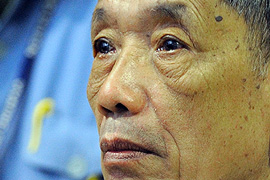Cambodia awaits Khmer Rouge verdict
War crimes tribunal to issue verdict in trial of ex-prison chief on Monday.

Duch last year repeatedly used nine months of hearings at Cambodia’s UN-backed court to beg forgiveness for overseeing the murders of around 14,000 people at the Tuol Sleng torture centre over three decades ago.
But the former math teacher, 67, one of five senior members of the communist movement detained by the court, surprisingly asked to be released in the final day of hearings on grounds he was not a key leader in the government.
‘Genuine apology’
Few expect judges to take his acquittal demand seriously, although analysts speculate he will appeal his sentence after it was announced this month that he sacked Francois Roux, his French lawyer, for “lack of confidence”.
| From the blogs | ||
|
“For Duch, the chamber will have to decide whether his apology was genuine, especially in light of his change of plea for acquittal at the end,” Michelle Staggs, the deputy director at the Asian International Justice Initiative, said.
Duch will continue to be represented by Kar Savuth, his Cambodian lawyer, while the court itself has faced controversy during the trial.
Prosecutors spent most of the trial portraying Duch, who was captured in 1999, as a meticulous executioner who built up a huge archive of photos, confessions and other evidence documenting inmates’ final terrible months.
Terrified bureaucrat
The trial’s format allowed Duch to comment on all testimony and repeatedly give his own version, painting himself as a terrified bureaucrat who performed his duty out of fear leaders would kill him and his family.
 |
| Duch has asked the Cambodian court to acquit him of charges [File: AFP] |
“I tried to survive on a daily basis, and that’s what happened. And yes, you can say I am a cowardly person,” Duch told the court in September.
The Khmer Rouge, led by “Brother Number One” Pol Pot, emptied Cambodia’s cities during its 1975-1979 rule, exiling millions to vast collective farms in a bid to take society back to “Year Zero” and forge a Marxist utopia.
At least two million people were executed in the notorious “Killing Fields” or died from starvation and overwork before a Vietnamese-backed force toppled the government. Pol Pot died in 1998.
Other Khmer Rouge members awaiting trial next year are “Brother Number Two” Nuon Chea, former head of state Khieu Samphan, the ex-foreign minister Ieng Sary and his wife Ieng Thirith, who was the minister of social affairs.
